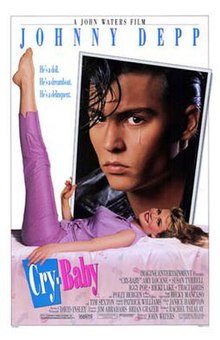
John Christopher Depp II is an American actor and musician. He is the recipient of multiple accolades, including a Golden Globe Award as well as nominations for three Academy Awards and two BAFTA awards. His films, in which he has often played eccentric characters, have grossed over $8 billion worldwide, making him one of Hollywood's most bankable stars.

Melrose Place is an American prime time television soap opera that aired on Fox from July 8, 1992, to May 24, 1999, for seven seasons. The show follows the lives of a group of young adults living in an apartment complex on Melrose Place, in West Hollywood, California. The show was created by Darren Star for Fox and executive produced by Aaron Spelling for his company, Spelling Television. It was the second series in the Beverly Hills, 90210 franchise. Season one and season two were broadcast on Wednesday at 9 pm, after Beverly Hills, 90210. In 1994, for its third-season and for the rest of its run, the show moved to Monday at 8 p.m.

Nora Louise Kuzma, known professionally as Traci Lords, is an American actress, singer, and former pornographic actress. She entered the adult film industry using a fake birth certificate to conceal that she was two years under the legal age of 18. Lords starred in adult films and was one of the most sought-after actresses in that industry during her career. When the FBI acted on an anonymous tip that Lords was a minor during her time in the industry, and that pornographers were distributing and selling these illegal images and videotapes, the resulting fallout led to prosecution of those responsible for creating and distributing the tapes, but the prosecutions fell through when it was revealed she was using a real federal passport as her proof of age along with a fake birth certificate and fake California drivers license. In addition, all of her adult films, and the September 1984 edition of Penthouse were banned as child pornography. Her last adult movie was filmed two days after her 18th birthday, by her own company, in what many claim was a way to profit from her notoriety when the truth was finally revealed.
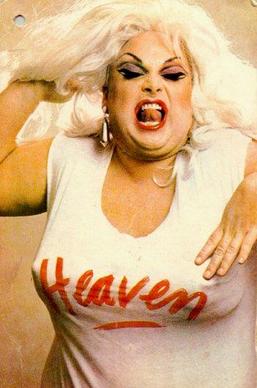
Harris Glenn Milstead, better known by the stage name Divine, was an American actor, singer, and drag queen. Closely associated with independent filmmaker John Waters, Divine was a character actor, usually performing female roles in cinematic and theatrical productions, and adopted a female drag persona for his music career.
The bunny hop is a novelty dance created at Balboa High School in San Francisco in 1952.

John Samuel Waters Jr. is an American filmmaker, writer, actor, and artist. He rose to fame in the early 1970s for his transgressive cult films, including Multiple Maniacs (1970), Pink Flamingos (1972) and Female Trouble (1974). Waters wrote and directed the comedy film Hairspray (1988), which was later adapted into a hit Broadway musical and a 2007 musical film. Other films he has written and directed include Desperate Living (1977), Polyester (1981), Cry-Baby (1990), Serial Mom (1994), Pecker (1998), and Cecil B. Demented (2000). His films contain elements of post-modern comedy and surrealism.
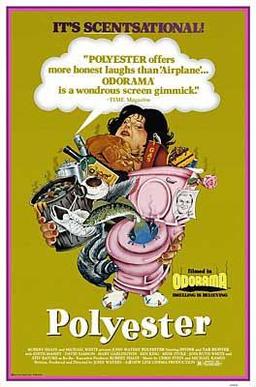
Polyester is a 1981 American comedy film directed, produced, and written by John Waters, and starring Divine, Tab Hunter, Edith Massey, and Mink Stole. It satirizes the melodramatic genre of women's pictures, particularly those directed by Douglas Sirk, whose work directly influenced this film. The film is also a satire of suburban life in the early 1980s, involving topics like divorce, abortion, adultery, alcoholism, racial stereotypes, foot fetishism, and the religious right.
Mary Vivian Pearce is an American actress. She has worked primarily in the films of John Waters.

Nancy Paine Stoll, known professionally as Mink Stole, is an American actress from Baltimore, Maryland. She began her career working for director John Waters, and has appeared in all of his feature films to date. Her extensive work with Waters has made her one of the Dreamlanders, Waters' ensemble of regular cast and crew members.

Dreamlanders are the cast and crew of regulars whom John Waters has used in his films. The term comes from the name of Waters' production company, Dreamland Productions.

Gerald Linford Beckley is an American singer, songwriter, and musician, and a founding member of the band America.
Amy Rose Locane is an American actress known for her role in John Waters' 1990 musical comedy Cry-Baby. In 1992, Locane portrayed Sandy Harling in the first season of the prime time soap opera Melrose Place. She appeared in the 1992 film School Ties alongside Matt Damon and Brendan Fraser, as the object of their affections.

The city of Baltimore, Maryland, has been a predominantly working-class town through much of its history with several surrounding affluent suburbs and, being found in a Mid-Atlantic state but south of the Mason-Dixon line, can lay claim to a blend of Northern and Southern American traditions.
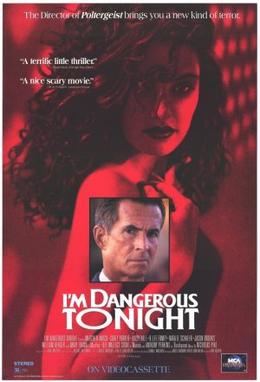
I'm Dangerous Tonight is a 1990 American made-for-television supernatural horror film directed by Tobe Hooper and starring Mädchen Amick, Corey Parker, R. Lee Ermey and Anthony Perkins. It made its debut on USA Network on August 8, 1990. It was loosely inspired by the novella of the same name by Cornell Woolrich.
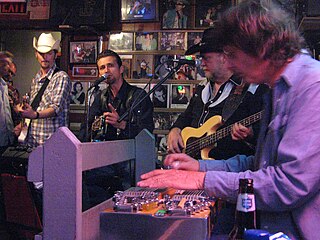
James Intveld is an American rockabilly musician, singer, songwriter, performer, actor, and film director from Los Angeles, California, United States.

Cry-Baby is a musical based on the 1990 John Waters film of the same name. The music is by Adam Schlesinger, lyrics by David Javerbaum and the book is by Mark O'Donnell and Thomas Meehan, who had previously done the book for the musical Hairspray, also based on a John Waters film of the same name.
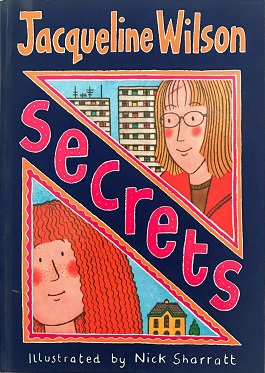
Secrets is a young adult book by Jacqueline Wilson, published in 2002 by Doubleday. Secrets is told from the point of view of two pre-adolescent girls, Treasure and India, via their diary entries. Despite their very different backgrounds - Treasure coming from a violent and abusive household, India having rich but inattentive parents - the girls strike up a friendship and their stories begin to intertwine. The Diary of Anne Frank is frequently referred to in the novel and influences the girls' actions.
In the Best Interest of the Children is a 1992 American made-for-television fact-based drama film starring Sarah Jessica Parker who plays a woman struggling with manic-depression while raising her five children. This leads to the children eventually being taken from her and put in foster care. The film originally premiered on NBC on Sunday, February 16, 1992.
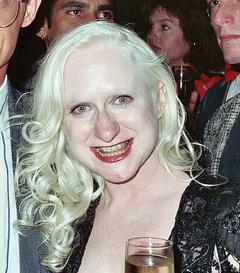
Kim Diane McGuire was an American lawyer and author. A former actress, she was best known for her role of Mona "Hatchet-Face" Malnorowski in John Waters' 1990 comedy musical Cry-Baby.

Carolyn Loretta Wasilewski was the 14-year-old victim of an unsolved murder that made national headlines during an intensive search for suspects near her home in Baltimore, Maryland. Her remains were discovered in a rail yard by an engineer on a Pennsy express train bound to Baltimore from Harrisburg, Pennsylvania on the morning of November 9, 1954.
